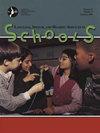理解语言病理学家对多层次支持系统的误解:从焦点小组分析的初步探索。
IF 2.9
3区 医学
Q1 AUDIOLOGY & SPEECH-LANGUAGE PATHOLOGY
Language Speech and Hearing Services in Schools
Pub Date : 2025-05-19
DOI:10.1044/2025_lshss-24-00148
引用次数: 0
摘要
目的:虽然在基于学校的言语和语言实践中实施多层次支持系统(MTSS)得到了临床文献、期刊文章和我们国家组织的压倒性支持,但现实情况是,许多言语语言病理学家(slp)可能不熟悉如何充分参与这一框架。在这篇以临床为重点的文章中,我们确定了与MTSS相关的潜在误解,并探讨了这些误解可能普遍存在的程度以及影响slp的驱动因素。我们还讨论了该领域可以采取的下一步措施,以支持关于MTSS的准确信念,并驳斥潜在的误解,从而使slp能够最好地成功参与MTSS框架。方法本临床重点文章的作者确定了12个与MTSS和slp相关的潜在误解。19名在美国公立学校工作的学校slp参加了一个75分钟的焦点小组,在这个小组中,他们被要求评价他们对所确定的误解的同意或不同意的程度,并解释他们的反应。焦点小组的规模从3到4个slp不等。结果焦点小组提供了关于slp与MTSS相关的观点的定量和定性数据,并提供了关于哪些误解可能普遍存在或影响slp如何构建、处理和反思MTSS的见解。结论:尽管基于学校的slp的角色和责任支持参与MTSS,但越来越多的人关注与MTSS实施相关的研究、政策和实践之间的差距。识别和解决SLP对MTSS的潜在误解将加强支持SLP参与MTSS的努力,从而提供符合所有学生优势和需求的高质量服务和支持。本文章由计算机程序翻译,如有差异,请以英文原文为准。
Understanding Speech-Language Pathologists' Misconceptions About Multi-Tiered System of Supports: Initial Exploration From a Focus Group Analysis.
PURPOSE
While there is overwhelming support from clinical texts, journal articles, and our national organization for the implementation of multi-tiered system of supports (MTSS) in school-based speech and language practice, the reality is that many speech-language pathologists (SLPs) may be unfamiliar with how to fully engage with this framework. In this clinical focus article, we identify potential misconceptions related to MTSS and explore the degree to which these misconceptions may be prevalent and the driving factors that influence SLPs. We also discuss what next steps the field can take to support accurate beliefs about MTSS and refudiate potential misconceptions in order to best position SLPs to successfully participate in an MTSS framework.
METHOD
Twelve potential misconceptions related to MTSS and SLPs were identified by the authors of this clinical focus article. Nineteen school-based SLPs who worked in public schools in the United States participated in a 75-min focus group where they were asked to rate the degree to which they agreed or disagreed with the identified misconceptions and explain their reactions. Focus groups ranged in size from three to four SLPs.
RESULTS
The focus groups produced both quantitative and qualitative data about SLPs' perspectives related to MTSS and provided insights into which misconceptions may be prevalent or influential in how SLPs frame, approach, and reflect on MTSS.
CONCLUSIONS
Although roles and responsibilities of school-based SLPs support engagement with MTSS, there is growing concern regarding the gap between research, policy, and practice related to MTSS implementation. Identifying and addressing potential misconceptions SLPs hold related to MTSS will bolster efforts to support SLP involvement in MTSS, resulting in high-quality services and supports matched to strengths and needs of all students.
求助全文
通过发布文献求助,成功后即可免费获取论文全文。
去求助
来源期刊

Language Speech and Hearing Services in Schools
Social Sciences-Linguistics and Language
CiteScore
4.40
自引率
12.50%
发文量
165
期刊介绍:
Mission: LSHSS publishes peer-reviewed research and other scholarly articles pertaining to the practice of audiology and speech-language pathology in the schools, focusing on children and adolescents. The journal is an international outlet for clinical research and is designed to promote development and analysis of approaches concerning the delivery of services to the school-aged population. LSHSS seeks to advance evidence-based practice by disseminating the results of new studies as well as providing a forum for critical reviews and meta-analyses of previously published work.
Scope: The broad field of audiology and speech-language pathology as practiced in schools, including aural rehabilitation; augmentative and alternative communication; childhood apraxia of speech; classroom acoustics; cognitive impairment; craniofacial disorders; fluency disorders; hearing-assistive technology; language disorders; literacy disorders including reading, writing, and spelling; motor speech disorders; speech sound disorders; swallowing, dysphagia, and feeding disorders; voice disorders.
 求助内容:
求助内容: 应助结果提醒方式:
应助结果提醒方式:


